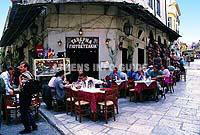 Traditional
Greek Cuisine
Traditional
Greek Cuisine
Its
unique tastes are some of the things which set Greece apart.
You are in for pleasant culinary surprises while staying in
Athens. Contrary to common belief you will soon discover that
Greek cuisine does not solely consist of moussaka, souvlaki
and horiatiki salata.
Greek cuisine has a great variety of dishes and can be an extremely
satisfying culinary adventure for both meat-eaters and vegetarians.
It could not be otherwise in the country that gave birth to
the symposiums and the Epicurean philosophers. It was, in fact,
Archestratos in 330 B.C., who wrote the first cookbook in history
and let us not forget, that cuisine is a sign of civilization.
Greece has a culinary tradition of some 4.000 years.
Nevertheless, like most national cuisines, the Greek cuisine
has both influenced others and embraced ideas from its easterly
and westerly neighbors. Greek cuisine has four secrets: good
fresh ingredients, judicious use of herbs and spices, the famous
Greek olive oil and its basic simplicity. Greek olive oil merits
a special mention. Present in almost all Greek dishes and in
most of them in abundance, it is of excellent quality and very
good for your health. Last, but not least, there are the vegetables
and herbs.
 Due to the mild Greek climate, forced growth of vegetables is
not widespread. Therefore most vegetables are grown naturally
and full of aroma and taste. You will be delighted by the taste
of Greek tomatoes, lettuces, carrots, onions, parsley and garlic,
not to mention the rich flavor and aroma of its fresh fruit
: grapes, apricots, peaches, cherries, melons, watermelons,
to name but a few. The herbs, that almost all the Greeks collect
from their mountains and countryside, are renowned for their
taste, scent and healing properties. Eating one of the many
different Greek dishes the aroma of oregano, thyme, spearmint
or rosemary, will inebriate you. Do not forget to try also the
Greek cheeses and particularly feta.
Due to the mild Greek climate, forced growth of vegetables is
not widespread. Therefore most vegetables are grown naturally
and full of aroma and taste. You will be delighted by the taste
of Greek tomatoes, lettuces, carrots, onions, parsley and garlic,
not to mention the rich flavor and aroma of its fresh fruit
: grapes, apricots, peaches, cherries, melons, watermelons,
to name but a few. The herbs, that almost all the Greeks collect
from their mountains and countryside, are renowned for their
taste, scent and healing properties. Eating one of the many
different Greek dishes the aroma of oregano, thyme, spearmint
or rosemary, will inebriate you. Do not forget to try also the
Greek cheeses and particularly feta.
As lambs and goats in Greece are free-grazing and the pastures
are very rich in herbs, the meats have a unique taste not to
be found anywhere else in the world. Seafood from the Mediterranean
sea is by far more tasty than that from the oceans. In the Aegean
and the lonian sea the waters are crystal clear and abound with
fish. Char broiled fresh fish is considered a treat.
 The
time of day when Greeks gather around a table to enjoy a meal
or various appetizers (mezedes) with ouzo, is a time held in
reverence by all the inhabitants of this country. For the Greeks,
sharing a meal with friends, either at home, in a restaurant
or a taverna, is a deeply rooted social affair. The Greek word
symposium, a word as ancient as the country itself, if translated
literally means drinking with company. The atmosphere in typically
Greek restaurants and tavernas, is very relaxed, informal and
unpretentious. Food preparation, on the other hand, has its
own sacred rules. Good amateur cooks are held in great esteem
in their social circles. A good house person in Greece, means
a good cook. And a good cook can spend days preparing a meal
for his or her friends.
The
time of day when Greeks gather around a table to enjoy a meal
or various appetizers (mezedes) with ouzo, is a time held in
reverence by all the inhabitants of this country. For the Greeks,
sharing a meal with friends, either at home, in a restaurant
or a taverna, is a deeply rooted social affair. The Greek word
symposium, a word as ancient as the country itself, if translated
literally means drinking with company. The atmosphere in typically
Greek restaurants and tavernas, is very relaxed, informal and
unpretentious. Food preparation, on the other hand, has its
own sacred rules. Good amateur cooks are held in great esteem
in their social circles. A good house person in Greece, means
a good cook. And a good cook can spend days preparing a meal
for his or her friends.
A Greek meal is a combination of experiences, a time to forget
all of live except its pleasures.


